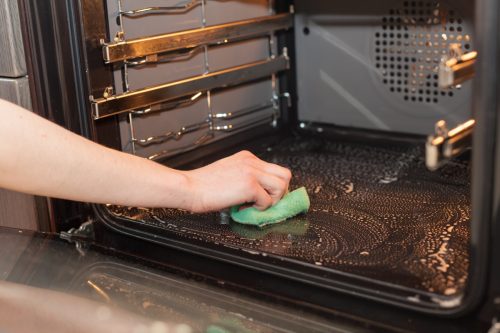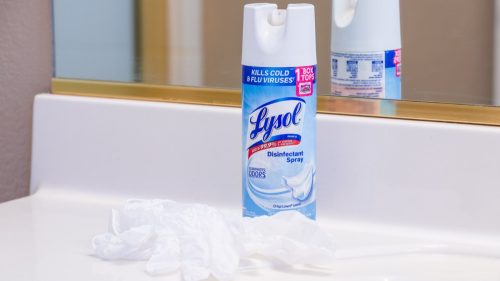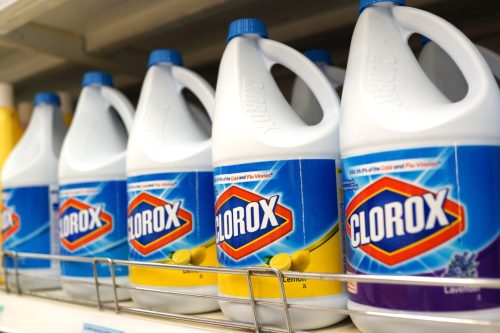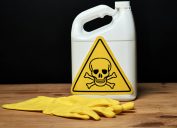These 4 Popular Kitchen Cleaners May Be Hazardous to Your Health, Doctor Says
Exercise caution when using them in your home—or don't use them at all.

With winter nearing its end, many of us will soon add "spring cleaning" to our to-do lists. According to Ipsos, nearly eight in 10 Americans say they do a thorough spring clean at least once a year—and the kitchen is priority number one for 64 percent of them. Survey respondents cited effectiveness as the deciding factor when choosing kitchen cleaners, but what many people may not realize is that many popular cleaning products contain toxins and harmful ingredients that can trigger asthma flare-ups, cause allergic reactions, affect your reproductive health, and even increase your cancer risk, according to the Environmental Working Group.
Peter Michael, MD, Health Advisor and Chief Medical Officer of VUE, tells Best Life, "It's important always to read the labels and follow the instructions of cleaning products to minimize the risk of harm to your health. Additionally, natural cleaning products can be a safer and healthier alternative to traditional cleaning products."
Read on for four common kitchen-cleaning products that can cause more harm than good.
READ THIS NEXT: If You're Using Any of These "Unsafe" Cleaning Products, Stop Now, FDA Warns.
1
Oven cleaners

A 2017 study published in Clinical Toxicology found that accidental ingestion of oven cleaners typically resulted in vomiting, abdominal pain, and throat irritation, while direct skin contact caused burns. In addition, inhalation of oven cleaners led to respiratory issues, including chest pain/tightness and coughing.
"Oven cleaners contain a range of chemicals, including lye and ammonia, which can harm your health," says Michael. "These chemicals can cause skin and eye irritation and irritate the respiratory system if inhaled. In severe cases, oven cleaners can cause chemical burns on the skin and eyes, leading to serious respiratory problems."
READ THIS NEXT: Never Use These Two Cleaning Supplies Together, CDC Warns.
2
Lysol

Lysol disinfectant products boast that they can kill 99.9 percent of viruses and bacteria, but that doesn't mean their ingredients are safe for human exposure. Dioxin, a main ingredient found in Lysol cleaning products, is a highly toxic chemical that's a byproduct of certain industrial processes, such as waste incineration, paper bleaching, and the manufacturing of pesticides and herbicides, says the National Institute of Environmental Health Sciences. Additionally, dioxins can cause developmental problems in children, infertility issues in adults, miscarriages, immune health damage, and hormone disruption.
"Inhalation of Lysol can cause central nervous system depression, while skin exposure can cause an allergic reaction, such as redness or mild inflammation," says Michael. "Ingestion of Lysol can also be hazardous, as it contains 79 percent denatured ethanol, which can irritate the eyes and mucous membranes."
3
Bleach

Bleach is a widely used household cleaner that's fantastic for sterilization and stain removal, according to the Cleaning Institute. However, bleach contains a chemical compound called sodium hypochlorite that's been found to cause irritation, nausea, vomiting, dizziness, breathing difficulties, headaches, and cough when inhaled, according to a 2022 study published in Environmental Analysis Health and Toxicology.
"Bleach is a common household cleaning product that can cause respiratory problems, especially when used in poorly ventilated areas," Michael explains. "The fumes from bleach can irritate the eyes, nose, and throat, leading to wheezing, coughing, and shortness of breath. Bleach can also cause chemical burns on the skin and eyes if not used properly." The takeaway? Exercise extreme caution if you choose to use bleach to clean your kitchen.
For more health news sent directly to your inbox, sign up for our daily newsletter.
4
Air fresheners

When you're done scrubbing your kitchen, do you like to spritz a little air freshener to make it smell as clean as it looks? Pay attention to the label, if so.
"Many air fresheners contain volatile organic compounds (VOCs), which can irritate the eyes, nose, and throat and cause headaches, dizziness, and nausea," says Michael. "Long-term exposure to VOCs can also increase the risk of certain health problems, such as asthma, allergies, and respiratory diseases."
VOCs aren't exclusive to air fresheners and cleaning products. They're commonly found in many consumer products, including furniture, paint, and sealants. A 2021 meta-analysis concluded that indoor VOC exposure was associated with asthma and related symptoms, including wheezing and throat irritation, as well as increased risk of pulmonary diseases and cancer.





















